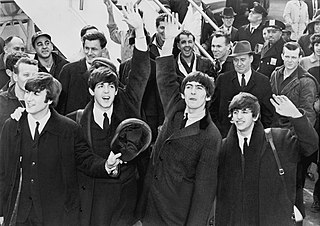
The British Invasion was a cultural phenomenon of the mid-1960s, when rock and pop music acts from the United Kingdom and other aspects of British culture became popular in the United States and significant to the rising "counterculture" on both sides of the Atlantic Ocean. Pop and rock groups such as the Beatles, the Rolling Stones, the Zombies, the Kinks, the Dave Clark Five, Herman's Hermits, the Hollies, the Animals, Gerry and the Pacemakers, the Searchers, the Yardbirds and the Who, as well as solo singers like Dusty Springfield, Cilla Black, Petula Clark, Tom Jones, and Donovan, were at the forefront of the "invasion".

In their native United Kingdom, between 1962 and 1970, the English rock band the Beatles released 12 studio albums, 13 extended plays (EPs) and 22 singles. The band's international discography is more complicated due to different versions of their albums sometimes being released in other countries, particularly during their early years on Capitol Records in North America. The Beatles' discography was originally released on the vinyl format, with full-length long plays (LPs), shorter EPs and singles. Over the years, the collection has also been released on cassette, 8-track, compact disc (CD), on a USB flash drive in MP3 and 24-bit FLAC format, and on digital media streaming services. Although their output has come to include vault items and remixed mash-ups, the Beatles' "core catalogue", recorded between 1962 and 1970, comprises 213 songs. Additionally, they released five tracks that are different versions of previously released songs: "Love Me Do", "Revolution", "Get Back", "Across the Universe" and "Let It Be"; two tracks in German: "Komm, Gib Mir Deine Hand" and "Sie Liebt Dich"; and two tracks that are duplicates of songs included on previous albums but also included on the album Yellow Submarine: "Yellow Submarine" and "All You Need Is Love".
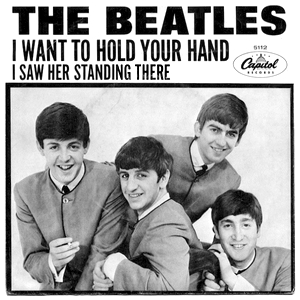
"I Want to Hold Your Hand" is a song by the English rock band the Beatles. Written by John Lennon and Paul McCartney, and recorded on 17 October 1963, it was the first Beatles record to be made using four-track equipment.

"She Loves You" is a song written by John Lennon and Paul McCartney and recorded by English rock band the Beatles for release as a single in 1963. The single set and surpassed several sales records in the United Kingdom charts, and set a record in the United States as one of the five Beatles songs that held the top five positions in the charts simultaneously, on 4 April 1964. It remains the band's best-selling single in the United Kingdom and the top-selling single of the 1960s there by any artist.

Beatlemania was the fanaticism surrounding the English rock band the Beatles in the 1960s. The group's popularity grew in the United Kingdom throughout 1963, propelled by the singles "Please Please Me", "From Me to You" and "She Loves You". By October, the press adopted the term "Beatlemania" to describe the scenes of adulation that attended the band's concert performances. From the start of 1964, their world tours were characterised by the same levels of hysteria and high-pitched screaming by female fans, both at concerts and during the group's travels. Commentators likened the intensity of this adulation to a religious fervour and to a female masturbation fantasy. Among the displays of deity-like worship, fans would approach the band in the belief that they possessed supernatural healing powers.

"From Me to You" is a song by the English rock band the Beatles that was released in April 1963 as their third single. It was written by Paul McCartney and John Lennon. The song was the Beatles' first number 1 hit on what became the official UK singles chart but the second, after "Please Please Me", on most of the other singles charts published in the UK at the time. "From Me to You" failed to make an impact in the United States at the time of its initial release. Instead, a 1963 cover version released by Del Shannon resulted in the song becoming the first Lennon–McCartney tune to enter the US pop charts. The Beatles' original was rereleased in the US in January 1964 as the b-side to "Please Please Me", and reached number 41.
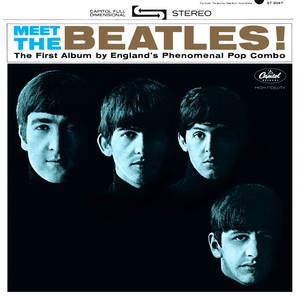
Meet the Beatles! is a studio album by the English rock band the Beatles, released as their second album in the United States. It was the group's first American album to be issued by Capitol Records, on 20 January 1964 in both mono and stereo formats. It topped the popular album chart on 15 February 1964 and remained at number one for eleven weeks before being replaced by The Beatles' Second Album. The cover featured Robert Freeman's iconic portrait of the Beatles used in the United Kingdom for With the Beatles, with a blue tint added to the original stark black-and-white photograph.

Introducing... The Beatles is the first studio album released by the English rock band the Beatles in the United States. Originally scheduled for a July 1963 release, the LP came out on 10 January 1964, on Vee-Jay Records, ten days before Capitol's Meet the Beatles!. The latter album, however, entered the U.S. album chart one week before the former. Consequently, when Meet The Beatles! peaked at No. 1 for eleven consecutive weeks, Introducing...The Beatles stalled at No. 2 where it remained nine consecutive weeks. It was the subject of much legal wrangling, but ultimately, Vee-Jay was permitted to sell the album until late 1964, by which time it had sold more than 1.3 million copies. On 24 July 2014 the album was certified gold and platinum by the RIAA.
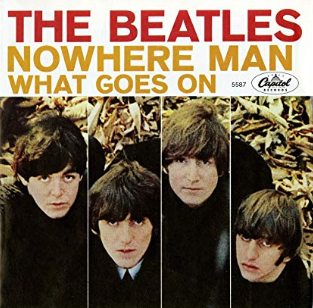
"Nowhere Man" is a song by the English rock band the Beatles. It was released in December 1965 on their album Rubber Soul, except in the United States and Canada, where it was first issued as a single A-side in February 1966 before appearing on the album Yesterday and Today. The song was written by John Lennon and credited to Lennon–McCartney. In the US, the single peaked at number 3 on the Billboard Hot 100 and number 1 on the chart compiled by Record World magazine, as it did the RPM 100 chart in Canada. The song was also released as a single in some countries where it had been included on Rubber Soul, including Australia, where it topped the singles chart.

4 by the Beatles is an EP release by The Beatles. It is the third of three EPs released in the United States, the second from Capitol Records.

"The Ballad of John and Yoko" is a song by the English rock band the Beatles that was released as a non-album single in May 1969. It was written by John Lennon and credited to the Lennon–McCartney partnership, and chronicles the events surrounding the wedding of Lennon and Yoko Ono. The song was the Beatles' 17th and final UK number-one single. In the United States, it was banned by some radio stations due to the lyric's reference to Christ and crucifixion. The single peaked at number 8 on the US Billboard Hot 100. The song has subsequently appeared on compilation albums such as Hey Jude and 1967–1970.

"Please Please Me" is a song released by the English rock band the Beatles. It was their second single in the United Kingdom, and their first in the United States. It is also the title track of their first LP, which was recorded to capitalise on the success of the single. It was originally a John Lennon composition, although its ultimate form was significantly influenced by producer George Martin.

Blast from Your Past is a compilation album by English rock musician Ringo Starr, released on Apple Records in 1975. It is both Starr's first compilation LP and his final release under his contract with EMI. It was also the last album to be released on the Beatles' Apple label until it was revived in the 1990s.
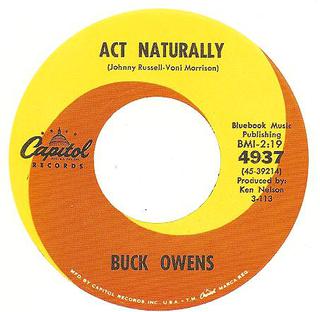
"Act Naturally" is a song written by Johnny Russell, with a writing credit given to Voni Morrison and publishing rights transferred to Buck Owens. It was originally recorded by Buck Owens and the Buckaroos, whose version reached number one on the Billboard Country Singles chart in 1963, his first chart-topper. In 2002, Shelly Fabian of About.com ranked the song number 169 on her list of the Top 500 Country Music Songs.
"Baby It's You" is a song written by Burt Bacharach (music), Luther Dixon, and Mack David (lyrics). It was recorded by the Shirelles and the Beatles, and was a hit for both. The highest-charting version of "Baby It's You" was by the band Smith, who took the song to number five on the US charts in 1969.

The Capitol Albums, Volume 2 is a box set compilation composed of The Beatles' 1965 American Capitol Records releases. The set, which contains stereo and mono versions of all 92 tracks was announced on 22 March 2006.
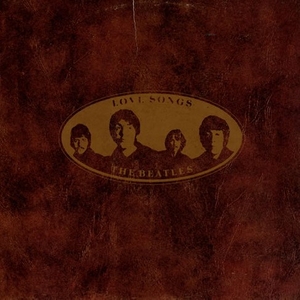
Love Songs is a compilation album that comprises love songs recorded by the Beatles between 1962 and 1970. It was released by Capitol Records in the United States on 21 October 1977 and on Parlophone in the United Kingdom on 19 November 1977. The compilation peaked at #24 in Billboard's Top LPs & Tape chart during a 31-week stay that began on 12 November 1977. The RIAA certified the album with sales of three million units in 2000 even though the compilation was deleted in the late 1980s. The New Zealand release followed the US release with cat. no. and pressing plates, and was released on 2 different EMI labels.
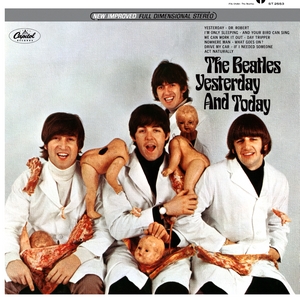
Yesterday and Today is a studio album by the English rock band the Beatles. Released in the United States and Canada in June 1966, it was their ninth album issued on Capitol Records and twelfth American release overall. Typical of the Beatles' North American discography until 1967, the album contains songs that Capitol had withheld from its configurations of the band's recent EMI albums, along with songs that the group had released elsewhere on non-album singles. Among its 11 tracks are songs from the EMI albums Help! and Rubber Soul, and three new 1966 recordings that would appear on Revolver in countries outside North America.

The Beatles experienced huge popularity on the British record charts in early 1963, but record companies in the United States did not immediately follow up with releases of their own, and the Beatles' commercial success in the US continued to be hampered by other obstacles, including issues with royalties and public derision toward the "Beatle haircut".
David "Bruce" Spizer is a tax attorney in New Orleans, Louisiana, who is also recognized as an expert on The Beatles. He has published twelve books, and is frequently quoted as an authority on the history of the band and its recordings.













